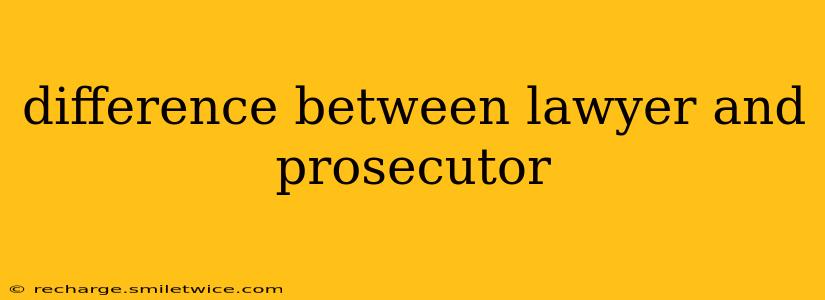While both lawyers and prosecutors work within the legal system, their roles, responsibilities, and goals differ significantly. Understanding these distinctions is crucial for anyone navigating the legal landscape, whether as a defendant, a witness, or simply someone interested in the legal profession.
What is a Lawyer?
A lawyer, also known as an attorney or solicitor (depending on the jurisdiction), is a legal professional who advocates for their clients' interests. This advocacy can take many forms, including:
- Representing clients in court: Lawyers present evidence, argue legal points, and generally represent their clients' best interests in legal proceedings. This could be in criminal, civil, or family court.
- Negotiating settlements: Many legal disputes are resolved outside of court through negotiation and mediation. Lawyers play a critical role in this process, working to achieve the best possible outcome for their clients.
- Providing legal advice: Lawyers advise clients on legal matters, helping them understand their rights and obligations. This includes drafting contracts, reviewing documents, and providing strategic guidance.
- Conducting legal research: Lawyers meticulously research relevant laws, precedents, and case histories to build strong arguments for their clients.
What is a Prosecutor?
A prosecutor, also known as a district attorney (DA) or state's attorney, is a lawyer who represents the government in criminal cases. Their primary role is to:
- Pursue justice: Prosecutors are tasked with upholding the law and ensuring that individuals accused of crimes are held accountable. Their goal isn't simply to win, but to seek justice within the bounds of the law.
- Present the case for the prosecution: In criminal trials, prosecutors present evidence, call witnesses, and argue the case against the accused. They have the burden of proving guilt "beyond a reasonable doubt."
- Investigate crimes: Prosecutors often work closely with law enforcement agencies during the investigation phase of a criminal case, reviewing evidence and determining whether charges should be filed.
- Negotiate plea bargains: Many criminal cases are resolved through plea bargains, where the accused pleads guilty in exchange for a reduced sentence. Prosecutors play a key role in negotiating these agreements.
Key Differences Summarized
| Feature | Lawyer | Prosecutor |
|---|---|---|
| Client | Private individuals or organizations | The government (state or federal) |
| Goal | To represent their client's best interests | To seek justice and uphold the law |
| Case Type | Criminal, civil, family, and more | Primarily criminal cases |
| Burden of Proof | Varies depending on the case | "Beyond a reasonable doubt" in criminal cases |
| Role in Court | Advocate for their client | Represents the state/government |
What is the difference between a lawyer and a public defender?
A public defender is a specific type of lawyer. They are government-employed lawyers who represent individuals accused of crimes who cannot afford private legal counsel. While they are lawyers, their role is distinct from that of a prosecutor; they work to defend their clients against the prosecution's case, just like a private defense attorney would.
Can a lawyer become a prosecutor?
Yes, many lawyers choose to become prosecutors. The experience gained as a lawyer in various areas of law can be highly beneficial to a prosecutor's work. Conversely, prosecutors can choose to transition to private practice as lawyers after their time in the public sector.
What are the ethical considerations for a prosecutor?
Prosecutors have a unique ethical responsibility. They are not merely advocates; they are also ministers of justice. They are obligated to pursue justice, not just convictions. This means they must ensure fairness, disclose exculpatory evidence (evidence that favors the defense), and avoid tactics that would undermine the integrity of the legal system. Ethical breaches by prosecutors can have serious consequences.
Understanding the differences between a lawyer and a prosecutor is crucial for anyone interacting with the legal system. Their distinct roles and responsibilities ensure a fair and just legal process.
